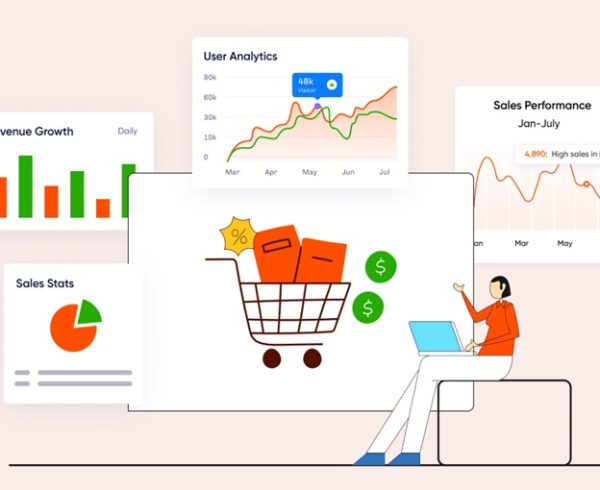In the world of digital marketing, organic social media is a powerhouse for driving traffic, increasing brand awareness, and fostering engagement. But without the right tools, measuring the effectiveness of your organic social strategy can be a challenge. This is where the organic social Google Analytics strategy comes in. With the right setup, you can unlock a wealth of insights about how your organic social media efforts are performing and adjust your strategy to maximize results.
Google Analytics, especially its latest version Google Analytics 4 (GA4) offers robust tracking capabilities for organic social media traffic. Whether you’re trying to understand how users interact with your content, monitor cross-network performance, or differentiate between traffic from various channels like direct or referral Google Analytics data, GA4 has you covered. Understanding how to use these insights can be a game-changer for marketers looking to optimize their organic social media efforts.
This article will take a deep dive into how to boost your organic social strategy using the power of Google Analytics. You will learn how to track social media traffic effectively, distinguish organic social from other traffic sources, and implement GA4 tools to measure performance across multiple networks.
By the end of this guide, you will be equipped with the knowledge to use organic social Google Analytics to its fullest potential. This includes understanding what organic social is in Google Analytics 4, how to track and interpret traffic, and leveraging key reports and metrics to boost your social media strategy.
Whether you’re a marketer, a business owner, or an agency professional, these insights will help you make data-driven decisions to refine your organic social strategy and get the best return on your social media investment.
Understanding organic social Google Analytics 4
Before diving into how to boost your organic social strategy using Google Analytics insights, it’s essential to grasp what organic social traffic means in the context of Google Analytics 4 (GA4).
Organic social refers to unpaid traffic that comes from social media platforms such as Facebook, Instagram, Twitter, LinkedIn, and others. These visitors are discovering your content naturally. whether through shared posts, hashtags, or engagement with your social media presence rather than through paid advertising. For any business focused on long-term growth, organic social traffic is invaluable, as it demonstrates that people are genuinely interested in your content and willing to engage without the push of paid campaigns.
In GA4, organic social Google Analytics traffic can be tracked and analyzed to measure how users from these platforms interact with your site, where they come from, and what actions they take. It’s essential to distinguish organic social from other types of traffic, such as:
- Referral traffic: When users come to your site through a link from another website, such as a blog or news article. You can view these details under Referral Google Analytics reports.
- Direct traffic: When users visit your site by typing the URL directly into their browser or through saved bookmarks. These interactions are categorized under Direct Google Analytics reports.
By distinguishing these types of traffic sources, you can accurately assess how much of your site’s traffic comes from organic social media compared to other channels.
Organic Social vs. Paid Social in Google Analytics 4
It’s important to differentiate between organic social and paid social traffic. Google Analytics 4 can track both types, but the insights derived from each may influence your strategy differently.
- Organic social traffic measures the unpaid reach of your social media efforts.
- Paid social traffic comes from social media ads that you invest in, such as promoted posts or advertisements.
By separating these traffic sources in GA4, you can evaluate whether your paid social efforts are yielding better results than your organic social media strategy, or vice versa.
Setting Up Organic Social Tracking in Google Analytics 4
To start leveraging organic social Google Analytics insights, you first need to make sure that your site is set up to track traffic accurately from social media platforms. Here’s how to do that:
1. Configure GA4 to Track Social Media Traffic
If you haven’t already migrated to Google Analytics 4, it’s essential to do so as the platform provides more advanced tools for tracking and analyzing user interactions across multiple channels, including social media. Once GA4 is set up, follow these steps:
- Go to the Admin panel in your GA4 account.
- Under Property Settings, ensure you have enabled Enhanced Measurement for social interactions. This setting automatically tracks traffic from social media platforms and records events such as button clicks, shares, and outbound links.
- Configure your social media links with UTM settings. UTM tags are essential for distinguishing between different types of social traffic (organic vs. paid) and different platforms (Facebook vs. Twitter). The parameters to use are:
- utm_source=social
- utm_medium=organic
- utm_campaign=[specific campaign or content]
2. Track organic social Google Analytics in GA4 Reports
Once you’ve configured GA4, you can view detailed reports on your social media traffic. To track organic social traffic:
- Go to Reports in the left navigation bar.
- Click on Acquisition, then select Traffic Acquisition.
- From here, you can view your traffic by source/medium. Organic social traffic will be listed under sources like facebook.com / organic or instagram.com / organic.
By organic social Google Analytics this data, you can assess which platforms are driving the most organic traffic to your website and how users from these platforms behave once they arrive.
Leveraging Referral and Direct Traffic Insights for organic social Google Analytics Strategy
In addition to tracking organic social traffic, it’s important to keep an eye on referral and direct traffic in Google Analytics. These two sources can provide valuable context for your organic social strategy, helping you understand how users are reaching your site beyond just social media.
1. Understanding Referral Traffic in Google Analytics
Referral traffic comes from external websites that link back to your content. It could be from blogs, news outlets, or other platforms that mention or link to your site. Although referral traffic is distinct from social traffic, it can sometimes overlap with social mentions or content shared by influencers, so it’s important to monitor.
To view referral traffic:
- In the GA4 Acquisition report, select Referral as the source/medium.
- Look for any sites or blogs that refer traffic to your site.
By analyzing referral traffic, you can see which external sites are helping boost your social visibility and consider building relationships with these referrers for further organic exposure.
2. Utilizing Direct Traffic Insights
Direct traffic, on the other hand, refers to users who come to your site directly, either by typing in the URL or via saved bookmarks. While direct traffic is usually not tied to social media efforts, spikes in direct traffic can often be linked to successful organic social campaigns where users become more familiar with your brand and return to your site directly later on.
To track direct traffic:
- In the GA4 Acquisition report, select Direct as the source/medium.
Understanding the interplay between direct and organic social Google Analytics traffic can offer insights into brand awareness and repeat visits generated by your social media efforts.
FAQs
What is the difference between referral and organic social on Google Analytics?
Google Analytics categorizes referral traffic as users visiting a site through external links, while organic social traffic refers to users visiting a site through unpaid social media interactions.
What does Google organic mean in Analytics?
Google organic traffic refers to unpaid, organic search results on Google, indicating the effectiveness of SEO efforts in driving traffic naturally through relevant search queries.
What is organic social traffic?
Google Analytics is a powerful tool that tracks organic social traffic, a natural, unpaid source of visitors to your website, providing valuable insights into the effectiveness of your social media strategies.
What does social mean in Google Analytics?
Instagram is a popular social media platform that Google Analytics tracks, providing insights into user behavior, engagement, and conversions, highlighting the significant role of social media in website performance.
What is organic social in Google Analytics?
Google Analytics tracks organic social traffic, unpaid traffic from social media platforms like Facebook, Instagram, Twitter, and LinkedIn, allowing businesses to measure user engagement and assess the effectiveness of their social media strategies.
How to Track Cross-Network Social Media Performance in GA4
organic social Google Analytics strategies often involve multiple platforms, from Facebook and Instagram to LinkedIn, Twitter, and TikTok. To effectively optimize your strategy, you need to measure performance across all social networks. Cross-network Google Analytics tracking helps you do just that.
Setting Up Cross-Network Tracking in Google Analytics 4
To monitor how each social platform contributes to your organic traffic:
- Ensure each social link includes UTM parameters that identify the platform (e.g., utm_source=facebook, utm_source=twitter).
- In GA4, navigate to the Traffic acquisition report and filter by source/medium.
- You will now see traffic broken down by individual platforms (e.g., facebook.com / organic, twitter.com / organic).
By tracking performance across different platforms, you can determine which social networks generate the most traffic and engagement for your brand.
Analyzing Cross-Network Data for Optimization
Once you’ve gathered enough data on your cross-network traffic, it’s time to analyze which platforms are contributing the most to your goals, whether that’s traffic, engagement, or conversions. If Facebook is driving significantly more traffic than Instagram, you might decide to allocate more resources to Facebook. On the other hand, if LinkedIn is bringing higher-quality traffic that converts more often, you can tailor your content to attract more LinkedIn users.
Additionally, you can use the User Explorer and Engagement reports in GA4 to track individual user journeys across multiple social networks. This allows you to gain a deeper understanding of how users interact with your brand on various platforms and refine your strategy accordingly.
How to Track Social Media In Google Analytics 4
What is organic social in Google Analytics 4? Google Analytics 4 offers various tracking options for tracking social media engagement. The Acquisition Report allows you to track traffic sources, such as Facebook, Instagram, Twitter, and LinkedIn, by filtering for each platform. Event Tracking allows you to measure user engagement beyond just visiting your site, such as shares, comments, and likes. This data is vital for developing your social media approach. Goals and conversions are also available, allowing you to track the effectiveness of your content in driving real results. By setting up goals for each key action, you can measure the effectiveness of your social media campaigns. Overall, Google Analytics 4 simplifies the process of tracking social media engagement.
Boosting Your organic social Google Analytics Strategy Insights
organic social Google Analytics 4 can be used to enhance your organic social strategy by identifying top-performing platforms, measuring engagement across platforms, optimizing content for different audiences, refining your posting schedule, and setting up custom alerts for traffic spikes. By analyzing traffic acquisition reports, you can identify which platforms drive the most traffic to your site and focus on optimizing content for these platforms. By measuring engagement across platforms, you can guide your content strategy to encourage deeper engagement. Tailoring content for different audiences and adjusting your posting schedule can also help reach the largest audience. By leveraging Google Analytics insights, you can maximize your organic social media efforts and your reach.
To sum up, organic social Google Analytics 4 is a powerful tool for tracking, measuring, and optimizing organic social media strategies. It allows users to differentiate between organic, referral, and direct traffic, and analyze cross-network Google Analytics performance. This data-driven approach can guide decisions that boost social media performance, drive more traffic, and improve engagement and conversions. With the right setup and strategic approach, Google Analytics can be a valuable tool for refining and maximizing organic social media efforts.







